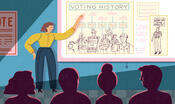The True History of Voting Rights


Current events may be hard to grapple with as multiple historically Black colleges and universities faced bomb threats, Minneapolis police fatally shot Amir Locke, and many states and districts continue to ban teaching inclusive books and talking about race. Amidst these aggressions, we want to remind Black educators to practice self-care—and all educators to elevate the importance of Black students’ experiences and their mental health. These resources can help.
School hardening policies—such as the presence of police and security, metal detectors, and harsh discipline codes—contribute to a criminalization culture in schools and students being pushed out of classrooms and into the school-to-prison pipeline. For Black girls, this criminalization culture causes serious additional harms.
This week, as Derek Chauvin goes on trial for the murder of George Floyd, we urge you to continue supporting and centering Black students. These resources will help you provide that support, initiate discussions on the impact of systemic racism and police violence, and bring the Black Lives Matter movement into your classroom.
As we celebrate Pride by honoring queer trailblazers, we want to especially uplift Black and Brown trans women and gender nonconforming people of color who led liberation movements nationwide. Out of the Stonewall Uprising came the very celebration of Pride we know today—and we have activists like Marsha P. Johnson, Sylvia Rivera and Miss Major Griffin-Gracy to thank. Use these resources to center queer Black and Brown activists who fought back against police brutality and oppression while also teaching about the continued fight for justice.
These resources can help you teach about the Black Lives Matters movement, its origins and why your students need to understand its relevance to their lives—regardless of their race.
